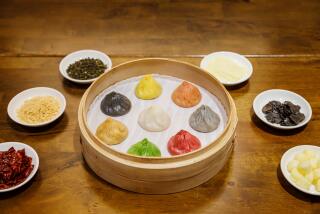KEEPING FIT : Eat, Drink and Be Merry in Spite of It : The right foods help keep up energy and keep off weight during the hectic holiday season.
Except for the sweets circulating in the office, at this hectic time of year you probably aren’t thinking much about food. But during the holiday season, you need good food more than ever.
“Healthy eating keeps you on an even keel, giving you incredible amounts of energy for last-minute shopping, present wrapping and food preparation,” says consulting dietitian Leslie Eckerling.
Eating well now also prevents you from gaining the four to seven pounds many people put on over the holiday season, says Fullerton registered dietitian Lisa Mosing, who is corporate nutritionist for Lucky Stores Inc.
To keep your energy up during these last few critical days and in the new year to come, keep the following tips in mind:
* Eat a high performance diet.
“Eating small meals high in complex carbohydrates consistently throughout the day will give you energy and help prevent illness,” says Lisa Beckley, clinical nutrition manager at Western Medical Center in Santa Ana.
Make sure to incorporate into your diet plenty of fruits and vegetables and starches such as potatoes, rice, pasta, breads, cereals and legumes (beans and peas). Avoid adding high-fat spreads and sauces to these foods.
* Don’t skip meals.
We’ve all done it--gotten so wrapped up in a shopping frenzy or gift-wrapping session that we forgo eating. Not a good idea, dietitians say.
“Your body is like a car,” says Mosing. “Just as you wouldn’t run your car without gas or oil, you shouldn’t run your body without food. Eating throughout the day sustains your energy.”
Beckley, who specializes in eating disorders and nutrition’s relation to chemical dependency, adds that, “When your brain isn’t adequately fueled with food on a continuous basis, you can experience irritability, fatigue, depression, food cravings and the urge to binge on sweets.”
Even though you’re busy and you may not feel hungry, it’s important to sit down and eat, she says. “You need the nourishment food gives you on a regular basis. You can skip meals for a while, but you will eventually hit the wall and collapse, which is something you don’t want to do on Christmas Day.”
Eating regularly also ensures that your sleep cycle is not disturbed so that you get adequate rest.
* Limit high-sugar and high-fat snacks.
“Sugary, fatty sweets are high calorie foods with no nutritional benefits that deaden the appetite for nutritious foods,” says Eckerling, who is president of L.I.T.E. Nutrition Inc. in Tustin. When you eat foods with a lot of sugar, your body uses the energy rapidly, leaving you on “empty” and much more vulnerable to irritability and fatigue. Too much sugar can also lead to a vicious cycle of craving more sweets.
Besides putting on weight, fatty foods are also a problem because they take a long time to digest, which studies have shown can lead to reduced reaction time and diminished visual perception, Mosing says.
True, goodies are an enjoyable part of this season, and you don’t want to skip them all together. Just make sure to eat healthy foods as your main source of nourishment and enjoy a few sweets as a sideline.
* Remember: Out of sight, out of mouth.
You’ll have a higher risk of overeating sweets if they’re right in front of you.
Instead of leaving tempting candy boxes and cookie tins in full view, hide them away in a desk drawer or cupboard. Better yet, share them with neighbors and friends or eat a few and then freeze portions for later use.
* Carry fatigue-control foods.
Don’t leave the house without an arsenal of good-for-you foods that will give you something to munch on when you’re out shopping or stuck in traffic.
Eckerling suggests carrying in your car a cooler full of healthy snacks.
Some good take-along foods include popcorn (without butter), bagels, pretzels, apples, oranges, pears, carrot sticks, broccoli, string cheese, a turkey sandwich on whole grain bread and tomato juice.
Other good choices suggested by Beckley are nonfat yogurt and milk, low-fat crackers with nonfat cheese, low-fat granola bars, dried fruit (in moderation), fat-free potato chips, cold cereal and rice cakes, of which there are now a variety of tasty flavors on the market such as nacho cheese and caramel corn.
* Make invigorating fast-food choices.
If you don’t have food with you and need to eat while shopping, buy quick pick-me-up fast foods such as plain popcorn, hot pretzels (just brush off some of the salt), bagels and hard rolls.
You also can try a salad with a small amount of dressing or one of the barbecue charbroiled chicken sandwiches offered in some fast-food restaurants. At a restaurant, order a turkey sandwich.
After your meal, if the candy stimulation in the mall has gotten to you, get a nonfat frozen yogurt, Beckley says. “This will quell your sweet craving and help you avoid reaching for that high-fat giant chocolate chip cookie.”
* Stay hydrated.
Make sure you drink plenty of fluids, because dehydration leads to fatigue, Beckley says.
Water is your best choice. Drink eight to 10 cups a day, which equals a half gallon. If you don’t like plain water, spruce it up with lemon or lime slices or try the many flavored mineral waters. Iced herb tea is another good choice.
Steer clear of sodas with caffeine because they are diuretics and will cause you to lose even more water.
* Avoid caffeine and alcohol.
“Both alcohol and caffeine are quick fix-ups that will give you a surge of short-lived energy,” Mosing says. But they have no nutritional value and can cause low blood sugar, which will make you less alert in the long run.
Alcohol is extremely high in calories and further compounds matters by reducing your willpower to eat healthfully. Limit your intake to one to two glasses of alcohol a week.
* Energize with exercise.
Because this is a busy time of year, many regular exercisers skip workouts, and that is not a good idea, Beckley says.
“When you stop exercising, it starts a negative chain reaction in your body. Your system slows down, and hormone changes occur which can increase your stress level and even cause insomnia.”
Exercise reduces stress and gives you energy, Eckerling says. “It changes your brain chemistry, causing an endorphin release which mellows you out. Exercising even decreases your appetite.”
If you’re having trouble getting to the gym during this hectic time, carry walking shoes in your car, and when safe, park farther away than usual from stores. Or take a few turns around the mall at a brisk pace.
* Be good to yourself.
“Many people tend to put themselves last at this time of year, which leads to stress,” Eckerling says. “When you feel overwhelmed by all of the demands, stop and take a break.”
Set aside 15 to 20 minutes a day for rest, and you’ll reap the benefits in renewed energy. Cuddle up with a favorite book, soak in a hot bath or work on a favorite craft.
* Supplement.
“A multivitamin can be a good insurance policy at this time of year,” Eckerling says. Don’t, however, replace food with vitamins. They will not give you critical nutrients such as fiber, carbohydrates and protein. A vitamin should be used only as a supplement.
* Go for convenience.
During these busy days, don’t feel bad about taking a few shortcuts in the kitchen. Take advantage of the many prepared foods on sale in supermarkets, such as cooked whole chickens. These can be supplemented with vegetables and potatoes for a quick, healthy meal. Or serve low-fat TV dinners with vegetables and bread. Make low-salt entrees even more tasty by adding herbs and spices.
More to Read
Eat your way across L.A.
Get our weekly Tasting Notes newsletter for reviews, news and more.
You may occasionally receive promotional content from the Los Angeles Times.









